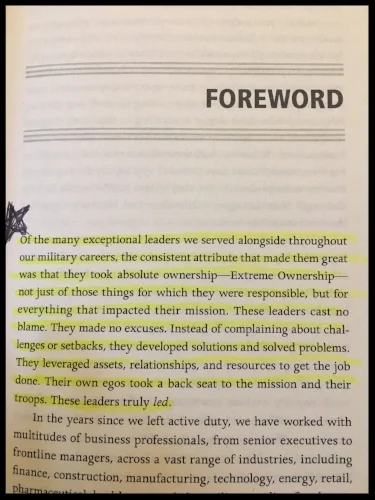Lesson: Take Extreme Ownership of Your Life
“‘There is only one person to blame for this: me. I am the commander. I am responsible for the entire operation. As the senior man, I am responsible for every action that takes place on the battlefield. There is no one to blame but me. And I will tell you this right now: I will make sure that nothing like this ever happens to us again.’
”
While on a mission with friendly Iraqi forces, the chaotic environment of war led to a misinterpretation of enemy forces and resulted in one of the worst scenarios of war, a blue-on-blue (friendly fire on friendly forces). It resulted in the death of an Iraqi soldier and a wounded SEAL.
Afterwards, in a debrief meeting, the master chief wanted to know who was to blame for this horrible situation. Some of the members of Jocko’s team stepped up and claimed responsibility. After a few minutes, Jocko had heard enough. There was only one person to blame said Jocko.
Himself.
As the senior man of the operation, he claimed that he was responsible for everything that happened to him and his men below him. It was a heavy burden, but it is the burden that leaders must carry.
Although taking full responsibility could have possibly resulted in Jocko being fired, it was the right thing to do . In hindsight, he notes that his decision to take full ownership actually led to his boss and team trusting him more.
It showed that, as a leader, Jocko could recognize his mistakes, could be humble, and was willing to take a hit for his team before anyone else was held responsible. By taking extreme ownership, Jocko was able to succeed in leading some of the most elite soldiers in the world and retired after twenty incredible years of service.
Authors Jocko Willink and Leif Babin.
Action:
Everyone makes mistakes, including leaders. Before blaming others for a mistake or problem, a leader must first look in the mirror at themselves.
If the team isn’t performing well, find out why and look for solutions. If an employee’s performance is subpar, perhaps it’s because the leader didn’t train them well enough and needs more practice. If an individual continually fails to meet standards, the leader must make the call whether to terminate them or hire others who can do the job.
Take extreme ownership for every part of your life. It will be tough at first, the extra responsibility will be a burden, however, by owning everything you will become more motivated and disciplined in every aspect of your life. This is especially true for people who are leaders. Leaders must acknowledge mistakes, admit failures, and develop a plan to succeed. When a leader sets such examples, the mindset of everyone on their team will develop in the team’s culture.
If you aren’t getting promoted at work, before blaming management, ask yourself if there’s a task you’re not doing or take on additional projects to show management you’re capable of doing more. If you aren’t losing weight, before blaming the lack of time and food options, ask yourself if you can find time workout before or after work and try creating a healthy meal plan for the week ahead.
If you aren’t doing well in school, before blaming the professor, ask yourself if you should be doing more practice problems or creating study groups to find other ways to learn the subject. If you aren’t feeling loved by a partner or friend, before blaming them for being a bad person, ask yourself what kind of person have you’ve been lately and what you can do to make the other person feel more loved.
The first page of "Extreme Ownership."
Personal Lesson:
In my own life, I was unsatisfied with my body, friendships and school. I blamed my genetics, friends and college professors for my unhappiness. I wanted to have a muscular body, better friends and a higher GPA. Blaming other people and God got me nowhere–it resulted in a large waste of energy with zero improvements. For some reason, the last place anyone wants to look when something is wrong is in themselves, and I was the same.
However, reading “Extreme Ownership” made it clear that looking inward and taking responsibility for every aspect of your life is the only true way to grow and succeed in life.
Instead of blaming exterior entities, I looked inward. I accepted the hand I was given and looked for possible solutions. I changed my diet, workout routine and found a gym partner that allowed me to better my physique. I started listening more to people and looked for ways to help them to become a better friend to others. As I became a better friend, the bond between my friendship grew stronger and closer. And instead of blaming my professors for being bad teachers, I started to spend more time teaching myself by reading textbooks and watching educational videos. As a result, I finished my first semester of graduate school with a 3.9 GPA.
Next time there’s a problem or an undesired result, before blaming others or making excuses, take extreme ownership of everything and reflect on yourself and what actions you can take to solve the problem.
Get some y’all. Out!
If you're interested in getting the book, click here or on the book below!
If you enjoyed this article, consider supporting our site or signing up for our monthly newsletter. Thank you!
Reader freebies:



